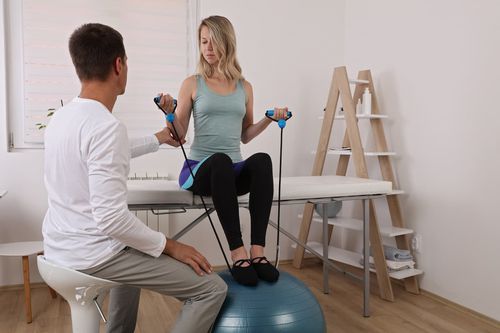What is Applied Kinesiology?
Applied Kinesiology is a type of complementary therapy that helps to determine imbalances in the organs and glands of the body by testing specific muscles for strength and weakness. Applied kinesiologists perform stimulation or relaxation on these key muscles to be able to diagnose and remedy various health problems.

How Does Applied Kinesiology Work?
Applied kinesiology is a diagnostic tool that employs feedback from the body to identify imbalances caused by stress, trauma, poor nutrition, muscular problems or abnormal chemical reactions. It is believed that the muscles in the body are excellent indicators of disharmony. Once the muscle weakness has been established, there are a variety of ways to solve the problem. If the problem is correctly approached, the outcome is very satisfactory for both the patient and the doctor.
Applied kinesiology is performed by a qualified kinesiologist using their hands. They test a specific muscle or muscle group within the body and evaluate its response to be able to pinpoint the location of the blockage and correct it from there. During a session, the practitioner asks their client to hold out their arm and resist force while the former tries to pull their arm down.
According to research, each muscle in the body corresponds to a specific meridian or energy pathway in the body. These meridians are said to relate to other organs and glands which allow the muscles to provide information about their function and energy.
There are five areas of diagnosis and therapy in applied kinesiology which include:
- Nervous system
- Lymphatic system
- Vascular (blood vessel) system
- Cerebrospinal system
- Meridian system
What Are the Common Causes of Muscle Weakness?
There are several factors that can contribute to muscle weakness, most of which result from holding on to emotional baggage. Based on studies made around applied kinesiology, unresolved negative emotions develop unhealthy habits and self-limiting beliefs and ideas, which lead to a slew of chronic physical conditions. That is why during muscle testing, the following would always surface as the main causes of muscle weakness:
- Dysfunction of nerve supply (nerve interference between spine and muscles)
- Lymphatic drainage impairment
- Blood supply reduction
- Abnormal pressure in cerebral fluid which affects nerve-to-muscle relationships
- Blockage of an acupuncture meridian
- Chemical imbalance
- Dysfunction of organs or glands
- Deficiencies or excesses in nutrition
What Are the Benefits of Applied Kinesiology?
Applied kinesiology is essentially used as a holistic approach to prevent ailments and diseases. It gives you a clear picture of your health and what needs to be done to restore balance to your mind and body. When performed by a trained kinesiologist, it offers the following benefits:
- Restores normal nerve function
- Relieves stress
- Increase mental alertness
- Restores postural balance and corrects gait (walking) impairment
- Eliminates chronic pain
- Improves range of motion
- Achieves normal functioning of the endocrine, immune, digestive, and other organ systems
- Intervene in degenerative processes early to delay or prevent pathological conditions
What Can You Expect From Applied Kinesiology?
Applied kinesiology takes the mind and body as a single unit, so the practitioner will look beyond the symptoms you came with. Your body may manifest a structural problem, for instance, but the kinesiologist will look into its underlying cause to help you understand what treatment plan you need to undergo in order to revive your health.
That being the case, expect to answer a series of questions during your initial appointment with a kinesiologist, ranging from your medical history and stress levels to your eating habits and the quality of your relationships, among others.
After the question and answer portion, the practitioner will begin to test your muscles and reflexes, as well as observe your posture and movement. Applied kinesiology can be performed remotely, so don't worry if you couldn't access a qualified kinesiologist in your vicinity. You can easily get in touch with one online and have your health issues addressed right in the comfort of your home.
A trained practitioner of applied kinesiology may not necessarily have to be a primary care provider, but they may collaborate with doctors, nurses, chiropractors and other registered health professionals.
Is Applied Kinesiology Safe?
To date, there have been no reports of side effects linked to muscle testing. It is generally safe and accepted as a complementary tool for evaluating a variety of physical and mental conditions.




